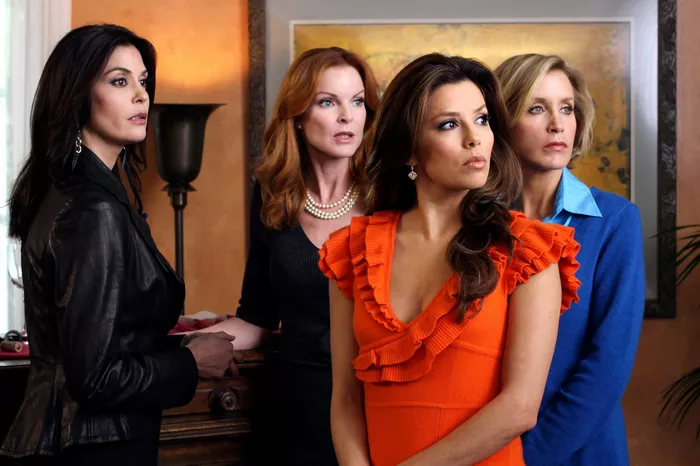In the gilded realm of Wisteria Lane, where white picket fences concealed secrets and intrigues, the facade of harmony masked a tumultuous reality. As the pages of Hollywood’s narrative continued to turn, Patty Lin, a former luminary of the television world, has dared to unmask the shadows that swathed her tenure on the iconic Desperate Housewives. Her memoir, “Unveiling Shadows: Memoirs of an Enigmatic Journey” (available now), peels back the layers of her decade-long odyssey through the corridors of Friends, Freaks and Geeks, Breaking Bad, and Desperate Housewives. Through her eyes, the cherished drama takes on a new hue, revealing the scars hidden behind the polished veneer.
Amidst the fervor of 2004, as the winds of change whispered her name, Patty Lin found herself captivated by the pilot script of Desperate Housewives, masterminded by none other than Marc Cherry. Drawn by the allure of the narrative, she stepped into the writers’ realm with optimism coursing through her veins. Yet, beneath the surface, a reality that diverged starkly from the polished exterior lay in wait.
Lin’s memoir uncloaks her experience within the writers’ enclave during the first season, a microcosm that was, unbeknownst to her, conspicuously homogenous. As the daughter of Taiwanese immigrants, she stood as the lone torchbearer of diversity amidst a roster of 10. The writers’ chamber, during its embryonic phase, exuded an illusion of democratic inclusivity—an ephemeral honeymoon that Lin understood to be impermanent. The narrative swiftly morphed, shattering any illusions of unity.
Within this web of anecdotes, Lin elucidates an instance where conversations skirted Margaret Cho’s sitcom, “All-American Girl,” a fleeting star in the television constellation. It was at this juncture that Cherry, the puppeteer of this entangled narrative, interjected, delivering a remark that would resonate as an unsettling echo, “Patty, you should write a show like that.” The words, veiled by apparent innocence, bore a subtext that thrust Lin into a narrative she had not scripted—an amalgamation of identity and stereotype. Lin shares her chagrin, voicing her disapproval of being lumped alongside Cho solely on account of shared heritage.
As the season unfolded, Lin’s relationship with Cherry metamorphosed into a dissonant symphony, marked by notes of creative disarray. The impression of Cherry’s vision remained elusive, rendering the journey unpredictable. Lin unveils an aspect previously hidden—experiences veiled by the cloak of silence. The veil lifts, revealing instances of overt racism that Lin encountered. An uncomfortable lunch echoed Cherry’s distinct voice, as he suggested Lin to emulate Cho—an implication that both women’s ethnicity trumped their distinct narratives.
From this juncture, Lin’s recounting veers into the turbulent terrain of creativity intertwined with chaos. The portrait that emerges is of a showrunner veering toward the precipice of uncertainty. Cherry, known for his idiosyncrasies, stands as an enigma in the memoir—a figure seemingly consumed by his own narrative, entangled within a labyrinth of obsessions.
Lin sketches a portrait of a showrunner wedded to his visions, who embarked on a fervent rewriting spree—revising even his own words with a fervor bordering on mania. Yet, amidst this whirlwind of creation, a glaring void emerges: the inability to articulate his intentions. His voice—uttering the phrase “No, that’s not it”—echoes through the narrative, a reminder of the creative gridlock.
The discord wasn’t confined to the writing domain; it permeated the operational realm. Cherry’s dalliance with deadlines, coupled with his peculiar predilections, established an unconventional dynamic. The “writing bungalow,” an enclave cloaked in secrecy and nestled in an undisclosed location, mirrored the showrunner’s mercurial attention span. Lin’s voice resonates as she narrates the tale of taming this erratic muse, capturing the eccentricities of this mastermind.
The writers’ room morphed into a microcosm where alliances forged and divisions etched their mark. Cherry, the helmsman, bestowed his favor upon a select few, forging an allegiance that relegated the rest to the periphery—a scenario that Lin likens to a “Lord of the Flies” descent.
Unraveling the complexities of the “Desperate Housewives” realm, Lin delves into the crux of her journey—ultimately parting ways with the production as the back nine episodes of the inaugural season were embraced by ABC. Yet, as the dust settled, Lin’s reflection reveals a discordant dissonance—her vision of the show, steeped in dark humor, succumbing to the assembly line of production, culminating in a symphony of mediocrity.
The narrative of “Desperate Housewives,” though hidden behind the facade of Hollywood’s glamour, surfaces through Lin’s memoir in a new light. The camaraderie and dissonance behind the scenes intertwine, leaving imprints that linger beyond the show’s curtain call.
As the chapters of Lin’s memoir unfold, the saga of “Desperate Housewives” casts a new shadow—an enigma veiled in controversy, camaraderie, and the ebb and flow of creativity. The revelation of Lin’s journey stands as a testament to the narratives concealed behind the polished veneer of entertainment, offering a lens that unveils the shadows lurking beneath the glitz and glamour.
While Lin’s memoir takes the reader on a retrospective voyage, the echoes of her experiences reverberate through the annals of television history, shaping narratives that transcend the confines of the screen.

